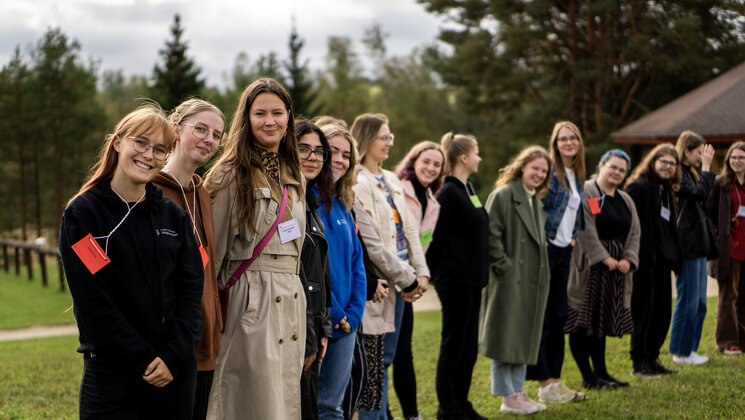-
Faculty of Arts and HumanitiesDean's Office, Faculty of Arts and HumanitiesJakobi 2, r 116-121 51005 Tartu linn, Tartu linn, Tartumaa EST0Institute of History and ArchaeologyJakobi 2 51005 Tartu linn, Tartu linn, Tartumaa EST0Institute of Estonian and General LinguisticsJakobi 2, IV korrus 51005 Tartu linn, Tartu linn, Tartumaa EST0Institute of Philosophy and SemioticsJakobi 2, III korrus, ruumid 302-337 51005 Tartu linn, Tartu linn, Tartumaa EST0Institute of Cultural ResearchÜlikooli 16 51003 Tartu linn, Tartu linn, Tartumaa EST0Institute of Foreign Languages and CulturesLossi 3 51003 Tartu linn, Tartu linn, Tartumaa EST0School of Theology and Religious StudiesÜlikooli 18 50090 Tartu linn, Tartu linn, Tartumaa EST0Viljandi Culture AcademyPosti 1 71004 Viljandi linn, Viljandimaa EST0Professors emeriti, Faculty of Arts and Humanities0Associate Professors emeriti, Faculty of Arts and Humanities0Faculty of Social SciencesDean's Office, Faculty of Social SciencesLossi 36 51003 Tartu linn, Tartu linn, Tartumaa EST0Institute of EducationJakobi 5 51005 Tartu linn, Tartu linn, Tartumaa EST0Johan Skytte Institute of Political StudiesLossi 36, ruum 301 51003 Tartu linn, Tartu linn, Tartumaa EST0School of Economics and Business AdministrationNarva mnt 18 51009 Tartu linn, Tartu linn, Tartumaa EST0Institute of PsychologyNäituse 2 50409 Tartu linn, Tartu linn, Tartumaa EST0School of LawNäituse 20 - 324 50409 Tartu linn, Tartu linn, Tartumaa EST0Institute of Social StudiesLossi 36 51003 Tartu linn, Tartu linn, Tartumaa EST0Narva CollegeRaekoja plats 2 20307 Narva linn, Ida-Virumaa EST0Pärnu CollegeRingi 35 80012 Pärnu linn, Pärnu linn, Pärnumaa EST0Professors emeriti, Faculty of Social Sciences0Associate Professors emeriti, Faculty of Social Sciences0Faculty of MedicineDean's Office, Faculty of MedicineRavila 19 50411 Tartu linn, Tartu linn, Tartumaa ESTInstitute of Biomedicine and Translational MedicineBiomeedikum, Ravila 19 50411 Tartu linn, Tartu linn, Tartumaa ESTInstitute of PharmacyNooruse 1 50411 Tartu linn, Tartu linn, Tartumaa ESTInstitute of DentistryL. Puusepa 1a 50406 Tartu linn, Tartu linn, Tartumaa ESTInstitute of Clinical MedicineL. Puusepa 8 50406 Tartu linn, Tartu linn, Tartumaa ESTInstitute of Family Medicine and Public HealthRavila 19 50411 Tartu linn, Tartu linn, Tartumaa ESTInstitute of Sport Sciences and PhysiotherapyUjula 4 51008 Tartu linn, Tartu linn, Tartumaa ESTProfessors emeriti, Faculty of Medicine0Associate Professors emeriti, Faculty of Medicine0Faculty of Science and TechnologyDean's Office, Faculty of Science and TechnologyVanemuise 46 - 208 51003 Tartu linn, Tartu linn, Tartumaa ESTInstitute of Computer ScienceNarva mnt 18 51009 Tartu linn, Tartu linn, Tartumaa ESTInstitute of GenomicsRiia 23b/2 51010 Tartu linn, Tartu linn, Tartumaa ESTEstonian Marine Institute0Institute of PhysicsInstitute of ChemistryRavila 14a 50411 Tartu linn, Tartu linn, Tartumaa EST0Institute of Mathematics and StatisticsNarva mnt 18 51009 Tartu linn, Tartu linn, Tartumaa EST0Institute of Molecular and Cell BiologyRiia 23, 23b - 134 51010 Tartu linn, Tartu linn, Tartumaa ESTTartu ObservatoryObservatooriumi 1 61602 Tõravere alevik, Nõo vald, Tartumaa EST0Institute of TechnologyNooruse 1 50411 Tartu linn, Tartu linn, Tartumaa ESTInstitute of Ecology and Earth SciencesJ. Liivi tn 2 50409 Tartu linn, Tartu linn, Tartumaa ESTProfessors emeriti, Faculty of Science and Technology0Associate Professors emeriti, Faculty of Science and Technology0Institute of BioengineeringArea of Academic SecretaryHuman Resources OfficeUppsala 6, Lossi 36 51003 Tartu linn, Tartu linn, Tartumaa EST0Area of Head of FinanceFinance Office0Area of Director of AdministrationInformation Technology Office0Administrative OfficeÜlikooli 18A (III korrus) 51005 Tartu linn, Tartu linn, Tartumaa EST0Estates Office0Marketing and Communication OfficeÜlikooli 18, ruumid 102, 104, 209, 210 50090 Tartu linn, Tartu linn, Tartumaa EST0Area of RectorRector's Strategy OfficeInternal Audit OfficeArea of Vice Rector for Academic AffairsOffice of Academic Affairs0University of Tartu Youth AcademyUppsala 10 51003 Tartu linn, Tartu linn, Tartumaa EST0Student Union OfficeÜlikooli 18b 51005 Tartu linn, Tartu linn, Tartumaa EST0Centre for Learning and TeachingArea of Vice Rector for ResearchUniversity of Tartu LibraryW. Struve 1 50091 Tartu linn, Tartu linn, Tartumaa EST0Area of Vice Rector for DevelopmentCentre for Entrepreneurship and InnovationNarva mnt 18 51009 Tartu linn, Tartu linn, Tartumaa EST0University of Tartu Natural History Museum and Botanical GardenVanemuise 46 51003 Tartu linn, Tartu linn, Tartumaa EST0International Cooperation and Protocol Office0University of Tartu MuseumLossi 25 51003 Tartu linn, Tartu linn, Tartumaa EST0
Revamped Philosophy Master's programme opens for admissions in January 2025

Our revamped English-language Philosophy Master's programme opens for admissions in January 2025. The updated programme equips students to address today’s global challenges – climate change, ageing populations, technological automation, and more - through well-founded philosophical reasoning and defensible solutions. Starting in 2026, the programme will be renamed Philosophy in Practice.
The curriculum development was led by the former Head of Programme, Associate Professor of Philosophy of Language, Alex Davies. Together with the team of lecturers who will teach the updated curriculum, the new programme is designed to highlight why and how addressing the challenges facing the world today—such as climate change, ageing populations, technological automation, and the shift towards a multipolar world—requires well-founded philosophical reasoning. “The programme still prepares students for doctoral studies if that is their goal, but it now places greater emphasis on supporting students who wish to pursue alternative career paths. The aim was to create a Philosophy MA that allows students with an interest in the subject to train in the discipline without being limited to a solely academic career,” explains Davies.
Who is the curriculum open to?
The curriculum is open to international students who hold or are completing their undergraduate degree—be that a degree in philosophy or in another discipline.
What was changed?
The reformed curriculum includes 12 new courses: three in the Start Module and nine in the Philosophy in Application Module. These courses replace the individual work that dominated the previous curriculum.
The Start Module (24 ECTS) takes place entirely in the first Autumn semester. It is designed to ensure that incoming students’ shared background-knowledge, critical communication and argumentation skills meet a common standard by the end of the first semester. Completion of this module is a prerequisite for the courses in the Philosophy in Application Module.
The Philosophy in Application Module (36 ECTS) brings master’s students from different years together into the same courses in the Spring semester. This module offers courses such as 'Political Philosophy and Global Challenges,' 'Well-being, Health, and Medicine,' and 'Applied Epistemology: Misbelief and What to Do About It.' These courses don’t teach philosophy in abstraction, but instead in application to challenges facing the world today.
Within the Diversification Module (30 ECTS), students can choose to extend their philosophical training by taking further philosophy courses from the Philosophy in Application module, or instead to acquire complementary skills from other disciplines: for instance, by taking courses in data analysis, new media and society, and social memory.
The Practice Placement Module (6 ECTS) and the Research Project Module (18 ECTS) are sites where students put what they have learnt in the Philosophy in Application Module and the Diversification Module to work. The Practice Placement Module supports students in finding internship opportunities, which are thematically derived from the courses in the Philosophy in Application Module. The module thereby enables students to draw strong connections between their studies and potential future workplaces. The Research Project Module is where students conduct their own research project—a site where they can combine the skills acquired from their studies to break new ground on a research question of their choice.
Our international learning environment allows students to meet peers from different countries and cultures and if desired, students can enrich their studies with exchange programmes and internships abroad."
Apply for the Philosophy Master's
Read more similar news






